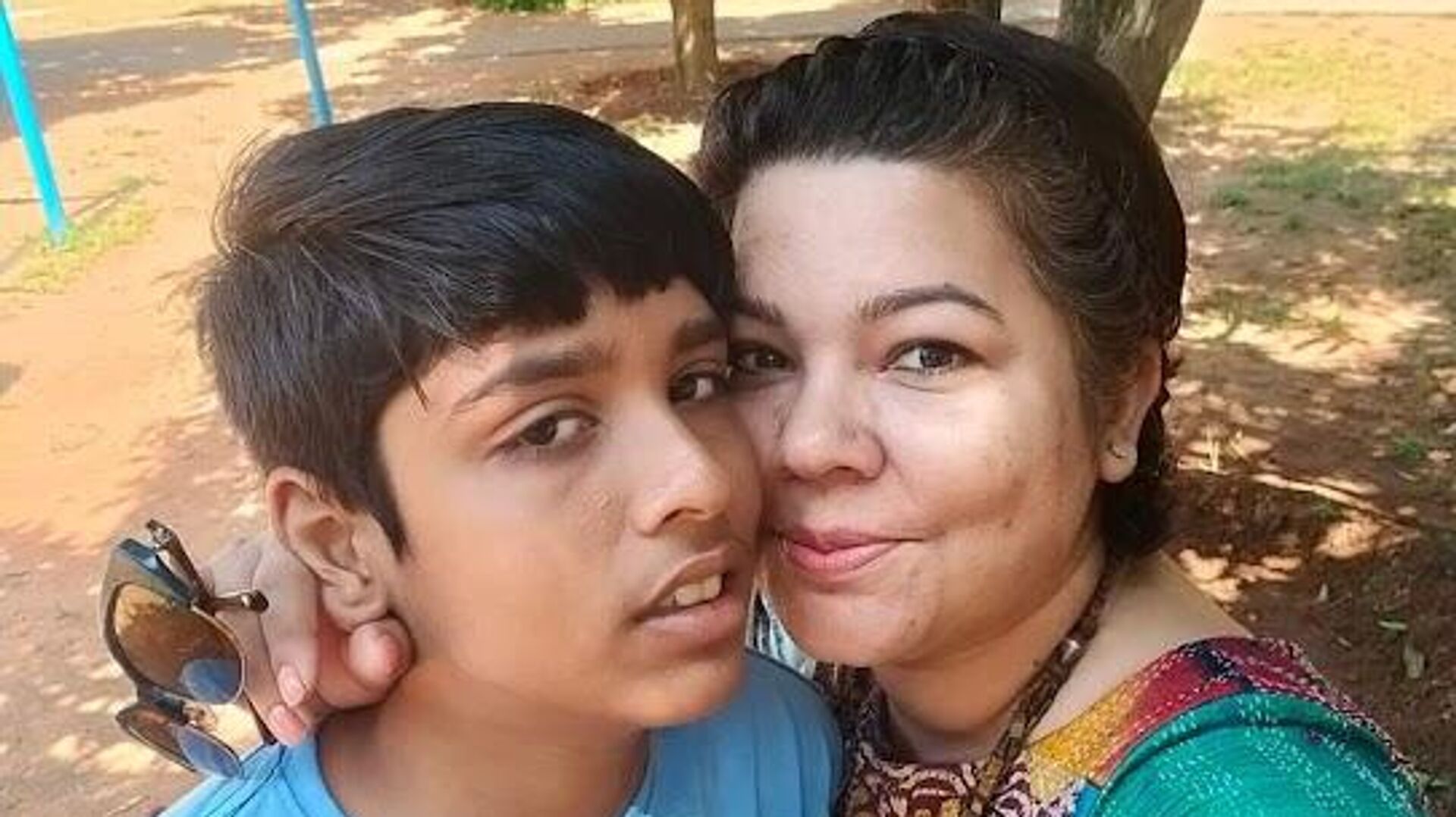India’s Ex-Air Force Officer Empowering Autism Moms to Become Changemakers

© Photo
Subscribe
Meet 43-year-old Antara Dey Chowdhury, a former Woman Air Force Officer from India’s Karnataka state’s Bengaluru city who hung up her uniform to bring up her autistic son amid great social discrimination and struggles to normalize autism in society.
She was an ordinary woman who went against all odds and carved a niche for herself in the male-dominated world of the Indian Air Force. Antara Dey Chowdhury showed her first act of courage by becoming squadron leader in the fighter controlling admin department and also studied law.
Back in 1996-97, even though her father wanted her to become an engineer, Chowdhury cleared a rigorous selection and training process that launched her career in the Indian Air Force.
“Women work doubly hard to prove themselves, half as good. You feel the pressure because you are commanding men who are your counterparts. You really need to work hard and live up to the challenge. You don't look at yourself as a woman or somebody different from your male counterparts. You signed up for a particular thing, and you do it gender irrespective. That's how I have approached it,” Chowdhury told Sputnik.
After getting married, Chowdhury stayed in a long-distance relationship and made it work.
Back in 2011, when Chowdhury was pregnant with her son Kabir, who is now 14, she took all the challenges in her stride.
“Kabir was born in January and I went on my maternity leave in December. During that time, I was huge and had this bad pain. My boss was very good and he got my workstation shifted downstairs.”
“I always thought that I don't want people to think I'm weak because I'm a woman. So, if I'm running, I will try to match strides with my male counterparts. I think that's what military training does to you. You learn to push your limits in a nice way. And you are constantly discovering yourself your strengths, and you get so much scope to grow as a person,” Chowdhury said.
Discovering Her Son’s Autism
After Kabir’s birth, Chowdhury's life seemed like one completely happy family. But little did she know that it would turn upside down after her son was diagnosed with autism when he was barely two years old.
Autism, also referred to as autism spectrum disorder, constitutes a diverse group of conditions affecting children's brain development, especially at an early age.
According to the World Health Organization (WHO), about 1 in 100 children worldwide have autism, and around 10% of school-aged children have been identified as having mild to severe learning disabilities.
Chowdhury went down memory lane to recall the phase when she discovered early signs of autism in her son.
I was parenting by the book and would read about the developmental milestones that a child is supposed to attain at a certain age. When Kabir was 15 months old, I noticed that he has started losing the skills he had, including forming words. He would just be by himself. I could see a definite regression. I could sense that something was wrong,” Chowdhury said.
When she first went to a pediatrician, Chowdhury shared that instead of focusing on Kabir, the doctor thought that she was probably a hypochondriac and counseled her.
“He said, ‘Oh, you are reading too many books, and you are a single parent. So you're just taking things too hard,” Chowdhury said.
When she returned to Bengaluru, Chowdhury reached out to three different doctors who confirmed that Kabir has autism.
“A few months elapsed between 15 months to two years in this. I lost about eight months and I felt so horribly guilty and beating myself up for the longest time,” Chowdhury said.
Early Diagnosis is the Key
Chowdhury feels that early diagnosis could have led to early intervention which could have created better chances of helping the child in question to develop cognitive skills.
“When we are born, the brain and cognition are developing typically till five years of age. And that is a very good time to start giving correct therapeutic inputs to take the child in the right direction. If you see that this child is probably lacking in motor skills, we start giving more inputs towards developing those motor skills, other areas of cognition,” Chowdhury explained.
Hanging Up her Uniform
In 2012, when Chowdhury realized that autism is non-curable, she decided to hang up her airforce uniform to take care of her autistic son.
“Everybody advised me not to leave my job because of what you do being an Indian Air Force officer. It's not a regular nine-to-five job that can land you work. I was more inclined to become more involved in Kabir’s journey in his growing up and tomorrow when I look back, I don't want to regret thinking that oh, I could have done it better or differently,” Chowdhury said.
Calling herself privileged, Chowdhury shared that financial support is a huge determinant because of which she managed without her income.
“The biggest challenge mothers of autistic child face is that they are unable to quit their job to take care of their child due to lack of financial support. Since therapies for autistic children are an expensive affair, the need for financial support is more. Leaving a job is a very difficult decision,” Chowdhury explained.
Moving from being a professional to the parent of an autistic child was a roller coaster journey for Chowdhury.
“When you see your child engaging in a meltdown, you feel so helpless. Parenting a child with any kind of disability adds to the challenges on a daily basis. How do I ensure my child is independent after I'm gone? That just takes over everything else and it takes a lot of balancing act to be able to say that I'm taking care of myself and I'm doing the best for my kid. But it's, it's a tightrope walk and initially is very difficult,” she said.
Facing social discrimination
The struggle to normalize autism was an uphill journey for Chowdhury as she faced rejection, discrimination, and biases in society.
“Wherever we went, restaurants, parks, and swimming pools, we would be stared badly by the people. In the initial years, I would come back home and cry. And then soon I realized that a lot of people do this because they don't know and don't understand autism. So I started talking about it to normalize autism, owning the place and being unapologetic about it,” Chowdhury said.
“I gave back to someone and said you think my kid is disturbing you? Well, the place belongs as much to my kid as to yours. So I'm not taking my kid away. I try to talk to them, and sensitize them by sharing that staring is rude and why Kabir appears different, in the hope that if I speak to 100 people, and even one understands a bit and we probably have one more inclusive person or less discriminatory person in the society,” she added.
She met a doctor who told her that 70% of autistic people don't speak and asked her why are you harping upon her child's speech.
The doctor’s statement left Chowdhury miffed, but she gave a befitting and said, “I'm not a professional, I don't know. You are a professional and the least you can do is probably guide me in the right direction than throwing such harsh facts on my face. My child may never speak, which came true as his speech came and went and was never established. But you don't say that to a parent, because I'm already struggling and trying my best to do what I can for my child. That came from a doctor who's supposed to work with autistic people, was a shock.”
A horrible experience with Kabir at the mainstream playschool dissuaded Chowdhury from sending her child to school.
“My sister was at school with Kabir and suddenly she calls me and tells me to come over. When I got there, I got to know that the class teacher slapped Kabir. He was barely three. Then I called the principal. The class teacher apologized and said that she didn't know he was not normal. Let that sink in. It's wrong on so many levels.
"I asked the teacher if it's okay to not slap normal people, according to your statement, and you're a normal person? So you're telling me if I slap you, or anyone else here who's not abnormal, It's okay? I told the principal that your teachers, with this kind of attitude, are not fit to even come near children, forget about working with such young children,” Chowdhury said.
After that incident, Chowdhury only sends Kabir to therapy centers that provide Applied Behavior Analysis (ABA) based intervention.
“Academic was never a priority with Kabir as it used to give him so much anxiety. I've always let Kabir guide me and I've taken my cues from him in terms of people I can trust, and a place that suits the best to go to,” Chowdhury shared.
Need for Mental Health & Support
The need of the hour, Chowdhury shared, is to provide mental health and support from society.
“A lot of special needs parents, especially moms who were the primary caregivers, resorted to suicide or harming the child, fatally sometimes. How drained, exhausted, and helpless the person feels because of which they take such a drastic measure. It just breaks my heart,” Chowdhury pointed out.
“We lose friends very fast because our commitments are so much and our children were so difficult to handle in the social setup. We are left pretty much alone. Hence, we need to step up and step in as a community in its entirety and not the special needs community. We have to look out for each other, reach out, check in on people, and whatever our bandwidth permits, just pitch in with that,” she added.
Becoming a Certified Assistant Behavior Analyst
A Certified Assistant Behavior Analyst (BCaBA) now, Chowdhury studied autism and started an organization 'Redili' a year ago with another mom of an autistic child with an aim to empower autistic individuals by maximizing their lifestyle and living a life of respect and dignity within society.
For over a decade, Antara has been helping several other autistic children and their parents.
“The family has continued to work with me, the kids continue to progress, and the mothers just grew from strength to strength. We train our autistic adults and young adults based on their current strengths and ready them to do different work for which they get paid. It's been an amazing journey,” Chowdhury signed off.

